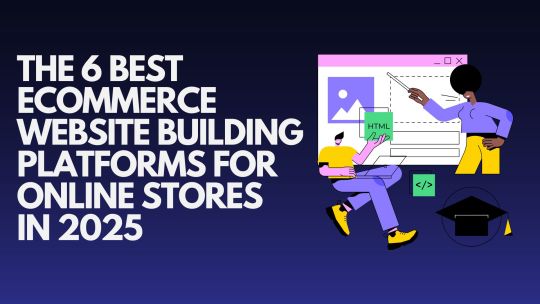#WebstoreSolutions
Explore tagged Tumblr posts
Text
Best 6 Platforms for Creating eCommerce Websites in 2025
Online sales are growing rapidly, with nearly 25% of retail transactions expected to happen online by 2026. For small businesses, having an ecommerce website is no longer optional—it’s essential. With modern tools, setting up an ecommerce website is easier and faster than ever. A reliable website builder enables you to showcase products, process payments, and handle shipping effortlessly, whether you're at your office or on the go.
After evaluating over 50 platforms, I’ve selected six top options tailored for small and medium-sized businesses. Whether you’re new to online sales or scaling up, these platforms offer the features and flexibility you need for ecommerce website development.

Why an Online Store is Vital for Small Businesses
Online shopping is not just the future—it’s the present. By 2026, nearly a quarter of retail purchases will occur online. An ecommerce website helps small businesses:
Highlight products with appealing designs
Accept secure payments
Streamline order and shipping processes All of this can be managed from anywhere, giving you greater control and convenience.
Choosing the Right Platform
Selecting the right platform is a critical step in ecommerce website development. The ideal platform should be:
User-Friendly: No technical skills required.
Budget-Friendly: Clear pricing with no hidden costs.
Scalable: Grows alongside your business.
Top 6 eCommerce Platforms for Small Businesses
Here are my top recommendations based on ease of use, affordability, and features:
Shopify: Best for a quick start.
Pros: Easy setup, extensive app ecosystem.
Cons: Costs can increase with added features.
Square: Great for hybrid online and in-store sales.
Pros: Seamless integration for physical and online stores.
Cons: Limited customization options.
Ecwid by Lightspeed: Perfect for small-scale sellers.
Pros: Free plan for up to five products.
Cons: Fewer features than Shopify.
BigCommerce: Ideal for high-volume operations.
Pros: Robust tools and scalability.
Cons: May feel complex for smaller businesses.
WooCommerce: Best for WordPress users.
Pros: Fully customizable and integrates seamlessly with WordPress.
Cons: A learning curve for beginners.
Wix: Excellent for creating a full-featured website and store.
Pros: Powerful site-building tools with ecommerce capabilities.
Cons: Less specialized for ecommerce compared to others.
Factors to Consider When Choosing
The perfect platform for your ecommerce website development depends on:
Budget: Start small and expand as your needs grow.
Features: Align the platform’s offerings with your business goals.
Ease of Use: Choose a solution you can manage independently.
Support: Ensure customer support is readily available.
Analytics: Robust tracking tools to monitor sales performance.
Affordable Solutions for Creators
If a full-service platform feels overwhelming, consider alternatives:
Online Marketplaces: Etsy or Envato Market let you sell products with minimal upfront costs.
Simplified Stores: Platforms like Gumroad and E-junkie provide affordable ways to build a simple store.
Boosting Your Store with Marketing
Leverage digital marketing strategies such as performance marketing and advanced targeting to enhance visibility and attract the right audience for your ecommerce website.
Conclusion
The success of your ecommerce website development hinges on selecting a platform that fits your business needs. Small businesses benefit from tools that emphasize usability, affordability, and growth potential. Whether you’re starting small or managing a larger enterprise, the right platform will ensure your ecommerce website drives sales and delivers exceptional customer experiences.
#eCommercePlatforms#BuildOnlineStore#eCommerceWebsite#2025eCommerce#OnlineStoreCreation#BestPlatforms2025#eCommerceDevelopment#WebstoreSolutions#eCommerceSuccess#WebsiteBuilder2025
0 notes